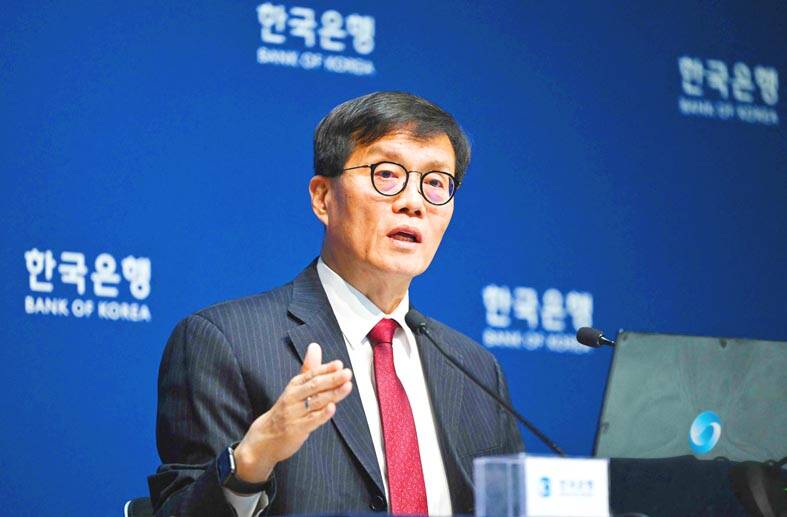The political turmoil in South Korea is weighing on the economy, Bank of Korea (BOK) Governor Rhee Chang-yong said yesterday, suggesting that authorities might downgrade growth forecasts and take stabilizing actions in response.
There is a high chance South Korea’s GDP would grow 2.1 percent this year rather than 2.2 percent as projected earlier, Rhee said as he assessed the economic impact of the turbulence that began when South Korean President Yoon Suk-yeol briefly imposed martial law earlier this month.
Rhee also raised doubts about whether the economy next year would expand 1.9 percent as forecast last month, calling for more fiscal support and other measures to ensure growth remains unimpeded.

Photo: AFP
The BOK is scheduled to make its next interest-rate decision next month.
Rhee said that the central bank would consider economic data to determine whether it would accelerate its policy.
Most economists expect the bank to take a breather next month after back-to-back cuts from October to last month.
A rate cut by the US Federal Reserve — with a decision expected yesterday — might give the BOK more room for easing if necessary, Rhee said.
Rhee expressed some relief over a decrease in political uncertainty after the parliament on Saturday voted to impeach Yoon for his martial law debacle.
“Volatility in domestic financial and foreign exchange markets has shown signs of stabilization after surging in the wake of the martial law declaration,” Rhee said. “While uncertainty remains, the political schedule ahead is now considered somewhat clearer.”
After turmoil erupted over the martial law decree, the authorities intervened in foreign exchange markets via what they call smoothing operations and would continue to do so should volatility become excessive, Rhee added.
The won has weakened by about 30 won against the US dollar since the martial law decree, he said.
Its level, which stood at about 1,435 per US dollar yesterday, should “normalize” according to economic fundamentals if South Korea’s policymaking process becomes stable again, he said.
Separately, South Korean Minister of Finance Choi Sang-mok said that the government is seeking to front-load its budget spending in the first half of next year to bolster the economy amid the political turmoil.
The government would “mobilize fiscal resources including those for public institutions, private investment, policy financing and so on,” Choi said. “We will also prepare additional measures to support vulnerable populations.”

In Italy’s storied gold-making hubs, jewelers are reworking their designs to trim gold content as they race to blunt the effect of record prices and appeal to shoppers watching their budgets. Gold prices hit a record high on Thursday, surging near US$5,600 an ounce, more than double a year ago as geopolitical concerns and jitters over trade pushed investors toward the safe-haven asset. The rally is putting undue pressure on small artisans as they face mounting demands from customers, including international brands, to produce cheaper items, from signature pieces to wedding rings, according to interviews with four independent jewelers in Italy’s main

Japanese Prime Minister Sanae Takaichi has talked up the benefits of a weaker yen in a campaign speech, adopting a tone at odds with her finance ministry, which has refused to rule out any options to counter excessive foreign exchange volatility. Takaichi later softened her stance, saying she did not have a preference for the yen’s direction. “People say the weak yen is bad right now, but for export industries, it’s a major opportunity,” Takaichi said on Saturday at a rally for Liberal Democratic Party candidate Daishiro Yamagiwa in Kanagawa Prefecture ahead of a snap election on Sunday. “Whether it’s selling food or

CONCERNS: Tech companies investing in AI businesses that purchase their products have raised questions among investors that they are artificially propping up demand Nvidia Corp chief executive officer Jensen Huang (黃仁勳) on Saturday said that the company would be participating in OpenAI’s latest funding round, describing it as potentially “the largest investment we’ve ever made.” “We will invest a great deal of money,” Huang told reporters while visiting Taipei. “I believe in OpenAI. The work that they do is incredible. They’re one of the most consequential companies of our time.” Huang did not say exactly how much Nvidia might contribute, but described the investment as “huge.” “Let Sam announce how much he’s going to raise — it’s for him to decide,” Huang said, referring to OpenAI

Nvidia Corp’s negotiations to invest as much as US$100 billion in OpenAI have broken down, the Wall Street Journal (WSJ) reported, exposing a potential rift between two of the most powerful companies in the artificial intelligence (AI) industry. The discussions stalled after some inside Nvidia expressed concerns about the transaction, the WSJ reported, citing unidentified people familiar with the deliberations. OpenAI makes the popular chatbot ChatGPT, while Nvidia dominates the market for AI processors that help develop such software. The companies announced the agreement in September last year, saying at the time that they had signed a letter of intent for a strategic